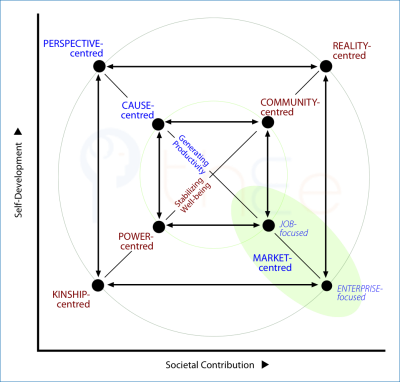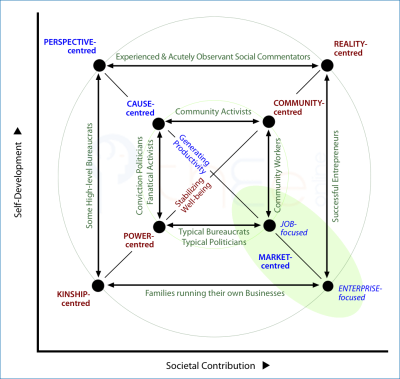Getting the Best of Both Worlds

Two Complementary Approaches
It is mandatory to hold one of the productivityapproaches. Everyone must produce, like it or not, with success and benefits depending greatly on the quality of this effort—plus another factor: chance. So everyone—every single person that has lived, is now living and will live—must endure mistakes and misfortunes, whose chief effect is demoralization.
By some quirk of evolution, productivity is complemented by well-being, whose approaches lie on the other diagonal. The well-being approaches provide support in the face of inevitable disappointments.
So people need to possess (i.e. come to identify with) two approaches: one from each diagonal. This leads to a tendency for horizontal and vertical pairing of mentalities, so that there are:
- Similar levels of self-development, or
- Similar degrees of social contribution.
Self v Society
 Variations in Self-Development: Horizontals
Variations in Self-Development: Horizontals

- Very low self-development: The strongest enterprises in the world (such as those that have been built up by close-knit families) are comprised of Kinship + Market-enterprisementalities. These support both devotion to something outside the self and a preparedness to sacrifice personal needs and ambitions. e.g. a family business forces mutual interdependence, and a close-knit family provides automatic loyalty and high levels of trust in business dealings.
- Low self-development: This category comprises job-focused people who are Power-oriented: e.g. union activists and managers, who play office politics; typical politicians, who are mainly interested in getting re-elected; and bureaucrats, whose salaries are paid by federal taxes and whose official position provides perks.
- High self-development: These people prioritize being of service to others, the Community-centred aspect, and also finding fulfilment in ideals, the Cause-centred aspect: e.g. employees in non-profit, voluntary bodies that campaign for social improvements or provide community services.
- Very high self-development: These are highly perceptive observers. Being Perspective-centred enables multiple viewpoints to be easily encompassed, and being Reality-centred enables focusing in on the particular relevant perspective. Combined, such people can produce realistic accounts of organizational issues or the social scene, and can work where that is desirable or beneficial: e.g. as consultants, as editorial writers.
 Variations in Societal Contribution: Verticals
Variations in Societal Contribution: Verticals
- Very low societal contribution: These Perspective + Kinship-centred people are employees who usually avoid public exposure, and enjoy switching off from work to enjoy family life and frequent holidays e.g. some high-level bureaucratic posts handle complex challenges impartially and dutifully.
- Low societal contribution:Power-centred and Cause-centred mentalities are a potentially explosive combination (v.i.) found in high-pressure social activists: e.g. academics, union activists, conviction politicians, religious zealots, members of liberation movements and extremist rights campaigners.)
- High societal contribution:Job-focused + Community-centredness are the primary characteristics of many employees in welfare agencies: e.g. social workers ready to apply common-sense methods to help communities and their members who are in difficult situations.)
- Very high societal contribution: Persistently successful entrepreneurs (Market-centred) are uninhibited by conventional views because they see the actual reality of opportunities and situations. Being Reality-centred), they can anticipate social responses, act swiftly and decisively, and keep risks low. To outsiders, initiatives seem to be far more risky.
Additional Aspects
 The Explosive Combination
The Explosive Combination
In the Power + Cause combination there are two sources of energy and force. Sometimes the Power element is primary, but an active conscience leads to adopting a Cause. Sometimes the Cause element is primary and frustration or an excess of zeal leads to an embrace of Power.
The combination of Power + Cause is dangerous because such people are prepared to use almost any means in their fight for what they believe is right, even if the result is illegal or paradoxical: e.g. killing innocent people to uphold the value of life or to promote a peaceful religion.
 Academics
Academics
Academics are unavoidably Cause-centred—around their discipline, its ideals, methods, theories and paradigms. However, once an academic is professionally established, other options are available:
- Perspective: think more broadly—colleagues may tut-tut that your disciplinary edge has been lost, but the media will admire you and offer opportunities to use your knowledge to express opinions.
- Power: enter university politics and you will find nothing is more ruthless except perhaps the Vatican. Good luck!
- Market: get tenure and take it easy; or use knowledge to start a business venture—with a primarily market-centred partner.
- Community: focus on applications of disciplinary knowledge to actually help people.
Unless previously present, the Kinship and Reality options are both distant and unappealing.
...which is the start of a new section. So you may wish to review the current section before proceeding:
 e.g.
e.g.
Originally posted: July 2009


![]() e.g.
e.g.